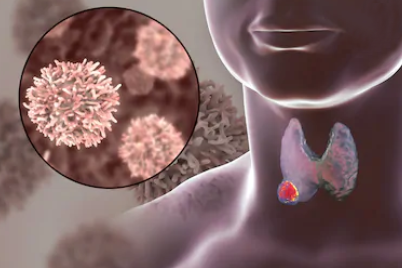 The thyroid is an endocrine gland located in front of the laryngeal tubercle. It is composed of two left and right lateral lobes and isthmus leaves. It is shaped like a butterfly and can secrete hormones such as thyroxine and calcitonin to control the body's metabolic balance. Thyroid cancer is a malignant tumor originating from thyroid follicular epithelium or para-follicular epithelial cells. It is also the most common malignant tumor in the head and neck. It includes four pathological types: papillary carcinoma, follicular carcinoma, undifferentiated carcinoma and medullary carcinoma. Papillary carcinoma with the lower malignancy and the better prognosis is the most common. Thyroid cancer may be related to oncogenes, growth factors, iodine intake, ionizing radiation, genetic factors, etc.
The thyroid is an endocrine gland located in front of the laryngeal tubercle. It is composed of two left and right lateral lobes and isthmus leaves. It is shaped like a butterfly and can secrete hormones such as thyroxine and calcitonin to control the body's metabolic balance. Thyroid cancer is a malignant tumor originating from thyroid follicular epithelium or para-follicular epithelial cells. It is also the most common malignant tumor in the head and neck. It includes four pathological types: papillary carcinoma, follicular carcinoma, undifferentiated carcinoma and medullary carcinoma. Papillary carcinoma with the lower malignancy and the better prognosis is the most common. Thyroid cancer may be related to oncogenes, growth factors, iodine intake, ionizing radiation, genetic factors, etc.
Diagnosis of Thyroid Cancer
The diagnosis methods of thyroid cancer are as follows:
- Routine laboratory test. Including blood routine tests, liver and kidney function tests, serum calcium, phosphorus and magnesium tests and other necessary laboratory tests.
- Thyroid function test. Including the examination of T4, T3, FT4, FT3 and TSH. Among them, the TSH test is an important preliminary screening test for clarifying thyroid function and one of the important indicators for diagnosing benign and malignant thyroid nodules.
- Thyroid autoantibody test. Autoantibodies related to thyroid diseases mainly include TgAb, TPOAb and TRAb. Among them, the TgAb test is an important auxiliary test for thyroglobulin detection, and the TPOAb test can assist in the diagnosis of medullary thyroid cancer.
- Tumor marker examination. Including thyroglobulin (Tg), calcitonin and carcinoembryonic antigen. Tg is a specific protein produced by the thyroid gland. It is an important indicator for judging whether a patient has tumor residual or recurrence, and can be used to monitor recurrence and metastasis. Thyroid cancer tumor marker examination provides evidence to further determine the pathological type of thyroid cancer.
- Molecular marker examination. Fine-needle aspiration biopsy still cannot determine benign or malignant thyroid nodules. Some molecular markers of thyroid cancer can be detected on the puncture specimens, such as BRAF mutation, Ras mutation, RETIPTC rearrangement and other conditions, which will contribute to the diagnosis and clinical prognosis prediction of thyroid cancer and facilitate the development of individualized diagnosis and treatment programs.
Other related diagnostic methods include imaging diagnosis, pathological examination, laryngoscopy, etc.
Advantages of Our Products
Creative Biogene's thyroid diagnostic products are mainly polyclonal antibody. High-quality thyroid cancer-related antibodies will help you accurately determine the expression of relevant important indicators.
Creative Biogene has a professional team of experts who developed quality thyroid cancer diagnostic products. We are committed to providing the best products to accelerate the realization of customers' research goals. We look forward to working with you for your cooperation.
Please contact us for more details.
Reference
- Kars A, et al. (2018). "Preoperative serum thyroglobulin level as a useful predictive marker to differentiate thyroid cancer." ORL. 80.5-6: 290-295.
For research use only. Not for any other purpose.
 The thyroid is an endocrine gland located in front of the laryngeal tubercle. It is composed of two left and right lateral lobes and isthmus leaves. It is shaped like a butterfly and can secrete hormones such as thyroxine and calcitonin to control the body's metabolic balance. Thyroid cancer is a malignant tumor originating from thyroid follicular epithelium or para-follicular epithelial cells. It is also the most common malignant tumor in the head and neck. It includes four pathological types: papillary carcinoma, follicular carcinoma, undifferentiated carcinoma and medullary carcinoma. Papillary carcinoma with the lower malignancy and the better prognosis is the most common. Thyroid cancer may be related to oncogenes, growth factors, iodine intake, ionizing radiation, genetic factors, etc.
The thyroid is an endocrine gland located in front of the laryngeal tubercle. It is composed of two left and right lateral lobes and isthmus leaves. It is shaped like a butterfly and can secrete hormones such as thyroxine and calcitonin to control the body's metabolic balance. Thyroid cancer is a malignant tumor originating from thyroid follicular epithelium or para-follicular epithelial cells. It is also the most common malignant tumor in the head and neck. It includes four pathological types: papillary carcinoma, follicular carcinoma, undifferentiated carcinoma and medullary carcinoma. Papillary carcinoma with the lower malignancy and the better prognosis is the most common. Thyroid cancer may be related to oncogenes, growth factors, iodine intake, ionizing radiation, genetic factors, etc.